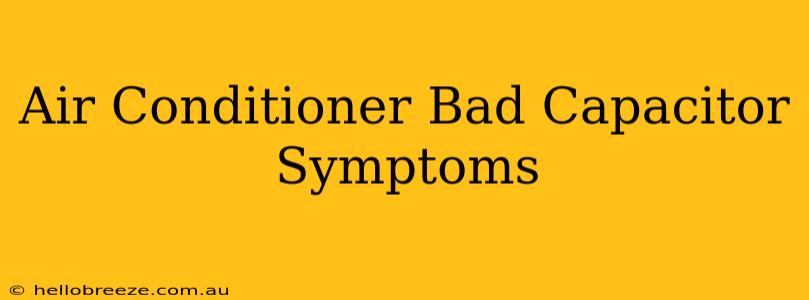Is your air conditioner acting up? A bad capacitor can be the culprit, leading to a range of frustrating problems. This comprehensive guide will help you identify the symptoms of a failing air conditioner capacitor, understand the risks, and know when to call for professional help.
Recognizing the Telltale Signs of a Failing AC Capacitor
An air conditioner capacitor is an essential component, storing energy to power the compressor's start-up. When it fails, your AC unit may exhibit several symptoms:
1. AC Unit Won't Turn On: The Most Obvious Sign
This is often the first and most noticeable sign. If your air conditioner simply refuses to start, a faulty capacitor is a strong suspect. You might hear a humming noise from the unit, but the compressor won't engage. This humming indicates the capacitor is trying to build up a charge but failing to deliver the necessary energy.
2. Weak or Intermittent Cooling: A Gradual Decline
Your AC might start working but struggle to deliver consistently cool air. This intermittent cooling suggests the capacitor is not providing the consistent power surge required by the compressor. The cooling may be weak, inconsistent, or cycle on and off erratically.
3. Overheating Compressor: A Serious Risk
A malfunctioning capacitor can cause the compressor to overheat. This is a serious issue that can lead to further damage to your air conditioner, potentially resulting in costly repairs. Never attempt to operate the unit if you suspect overheating.
4. Humming Noise from the AC Unit: A Clear Indication
As mentioned earlier, a constant humming sound coming from your air conditioner, without the compressor actually starting, is a strong indicator of a capacitor problem. This is the sound of the capacitor attempting to discharge, but failing to provide the sufficient power.
5. Frequent Cycling On and Off: Energy Waste and Inconsistent Cooling
Does your air conditioner turn on and off repeatedly, failing to maintain a consistent temperature? This erratic behavior might point to a failing capacitor that's struggling to deliver the needed power to the compressor to keep it running smoothly.
Understanding the Risks of Ignoring a Bad Capacitor
Ignoring a bad capacitor is risky and can lead to:
- Compressor Failure: The compressor is the heart of your air conditioner. A bad capacitor puts excessive strain on it, leading to potential burnout and costly replacement.
- Further Damage: A failing capacitor can trigger a cascade of problems, damaging other components in your system.
- Safety Hazards: Overheating compressors pose a fire risk. Never operate an air conditioner that shows signs of overheating.
- Increased Energy Bills: An inefficient system, caused by a faulty capacitor, will consume more energy, raising your monthly energy bills.
When to Call a Professional
While some basic troubleshooting can be done, capacitor replacement often requires specific knowledge and tools. If you suspect a bad capacitor, it's best to call a qualified HVAC technician. Attempting repairs yourself can be dangerous and may void any warranties.
Remember: Safety is paramount. Never attempt repairs if you are not comfortable or experienced with electrical work. A professional can diagnose the problem accurately, replace the capacitor safely, and ensure your air conditioner operates efficiently and safely. The cost of professional repair is far less than the cost of replacing a damaged compressor, and it avoids potential safety hazards.
This information is for educational purposes only. Always consult a qualified HVAC professional for diagnosis and repairs of your air conditioning system.

